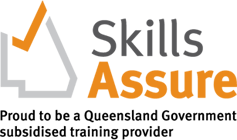If you’re interested in enrolling in a new qualification to develop your skills, you may be overwhelmed by the many choices available. There are several things to consider, and the right path for you will depend on what you’re hoping to get out of your training.
How much time you want to commit to a course, whether you’d prefer to study on campus or online, and what job you’d like to get once you complete your training determines which course style is best for you.
It’s essential to consider the core differences between the qualifications and understand the benefits of each learning style. In this blog, we’ll explore the key differences between certificates, diplomas and degrees and explore who each learning mode is suited to.
The Australian Qualifications Framework (AQF)
All formal qualifications in Australia fall under the Australian Qualifications Framework (AQF). This framework has a total of ten levels. The higher the course level in the AQF, the more advanced the qualification and the more challenging it is to complete.
The course levels are as follows:
- AQF Level 1 – Certificate I
- AQF Level 2 – Certificate II
- AQF Level 3 – Certificate III
- AQF Level 4 – Certificate IV
- AQF Level 5- Diploma
- AQF Level 6 – Advanced Diploma/Associate Degree
- AQF Level 7 – Bachelor’s Degree
- AQF Level 8 – Bachelor Honours Degree/Graduate Certificate or Diploma
- AQF Level 9 – Master’s Degree
- AQF Level 10 – Doctoral Degree
All accredited courses are excellent ways to start your new career path in a niche industry. Still, key differences between each qualification level make the courses more or less suited to specific career paths and learning styles. Let’s look at each qualification type in more detail.
What are certificates?
Certificates focus on providing hands-on, technical skills and practical knowledge that can immediately be applied to job situations.
Certificates I-IV make up the first four levels of the AQF framework. These qualifications are typically short courses and can usually be completed in 1-6 months, although some advanced certificates may take longer.
Certificates I and II offer the basic, functional skills required to perform a specific role to an acceptable level. In contrast, certificates III and IV typically require more advanced skills and teach applicants how to perform a broader range of tasks related to a niche role.
Certificates can usually be completed part-time. They are also often completed online or in a blended learning setting, allowing applicants to work at their own pace. Many also include a vocational placement designed to give applicants the work experience needed to succeed in a practical role.
Compared with many higher education courses, which focus on theoretical knowledge and exam-based studies, certificates are usually very hands-on, with many practical assessments used to test whether the applicant can perform critical tasks to a high level.
Many vocational roles, such as child care workers, mental health workers and disability care workers, require a minimum of a certificate III or IV qualification. Higher certificates are an excellent way to start a new role without undertaking a more complex, time-intensive course.
Who are certificates suited to?
Certificates are suited to those that want to gain quick, transferrable skills and knowledge that they can immediately apply to a chosen career path. This makes these courses perfect for those who::
- Are interested in a career in a trade or craft role.
- Want to change careers.
- Want to boost their employability.
- Are returning to work after time off and want to refresh their knowledge.
What kind of jobs can I get with a certificate?
Certificates are an excellent way to acquire practical skills to succeed in a niche vocational industry. Following a relevant certificate, you could expect to get a job in roles such as a:
- Childcare Worker
- Aged Care Worker
- Massage Therapist
- Hospitality Worker
- Chef
- Barber/Hairdresser
- Truck Driver
Who offers certificates?
Certificates are offered by a range of educational institutes, including TAFE (Technical and Further Education) institutes, universities, private colleges and private training organisations, like Sage Education.
What are diplomas?
Diplomas are more comprehensive and complex than certificates. They usually take 1-2 years to complete, although some course providers may be able to offer shorter diploma-level qualifications.
Diploma courses cover levels 5 and 6 of the Australian Qualifications Framework. For this reason, they typically go more in-depth than certificates, with a focus on providing a more thorough understanding of a subject.
Most diploma qualifications contain a blend of hands-on teaching and theoretical knowledge. Students will usually be required to work well independently and in groups using cognitive and communication skills. Applicants may also need to prove they can apply learned theory to practical job situations.
Depending on the course, students may be able to complete their diploma online, allowing them to work at their own pace. However, some diplomas may need to be completed entirely in a classroom environment or a blended learning setting.
Some diploma courses can be completed with no prior knowledge. However, many require some level of previous educational or work experience. It may be necessary to start with a certificate course to gain the skills needed to undertake a higher-level diploma qualification.
Who are diplomas suited to?
Diplomas are suited to those who want a quick pathway to more advanced roles
- Want to gain advanced industry-specific skills for a specialised role.
- Are interested in moving toward a senior leadership role in their current field
- Want to expand on existing knowledge taught in certificate courses.
- Are looking to prepare for further study in a related field.
What kind of jobs can I get with a diploma?
A diploma course is an excellent pathway into many specialist roles. After completing your qualification, you could expect to start careers such as:
- Community Worker
- Event Manager
- Dental Hygienist
- Marketing Coordinator
- HR Officer
- Paralegal
- Early Childhood Educator
Who offers diplomas?
Like certificates, diplomas are offered by several different institutes across Australia. Many TAFE institutes, universities, private colleges and private education providers offer industry-specific diploma courses designed to provide a pathway into niche careers.
What are degrees?
Degrees are the most thorough, complex courses available to complete. They typically focus on providing a deeper understanding of a particular area. Students must demonstrate holistic theoretical knowledge and skills covering various contexts.
Degrees cover levels 7 to 10 in the AQF, meaning they are considerably more complex than both certificates and diplomas. Some degrees, like the graduate diploma, master’s degree and doctoral degree, can only be undertaken if the applicant has already completed an undergraduate degree. These qualifications are designed to build on the knowledge taught in previous degrees, allowing students to gain specialised expertise in a niche area.
Unlike certificates, which are usually hands-on, degree-based qualifications are usually based on complex theory, with an emphasis on lengthy written exams and essays.
Doctoral degrees (PhDs) are the highest level of qualification available on the AQF. They’re focused on extensive research and typically require a student to produce a unique, detailed thesis that substantially contributes to their chosen field. Note that PhD qualifications require students to be highly qualified – many students will complete both an undergraduate and master’s qualification before pursuing a doctoral degree.
Degree courses usually take 3-4 years to complete. Students must be heavily independent and will usually need to be comfortable working both in-person and on their own time.
Who are degrees suited to?
Degrees are suited to those who want to pursue a higher level of education in a specific academic field. They are an ideal option for those that want to:
- Gain a complete understanding of every aspect of their chosen discipline.
- Would like to open doors to advanced career paths in industries like medicine or law.
- Want to pursue a career in academia.
- Want to contribute to the advancement of their field.
What kind of jobs can I get with a degree?
Degrees are the ideal way to secure advanced roles in highly technical industries. For example, with a degree, you could expect to secure a job in careers such as:
- Dentist
- Lawyer
- Doctor
- Accountant
- Psychologist
- Occupational Therapist
- Nurse Practitioner
Who offers degrees?
Unlike certificates and diplomas, degrees aren’t usually offered by TAFE providers or private education providers. Students looking to study for a degree will usually need to choose a higher education provider, such as a university or private college.
Why should I study with Sage Education?
Sage Education is one of Australia’s leading providers of certificate and diploma-level courses. We provide the hands-on skills, practical knowledge and job-ready expertise our students need to thrive in vocational roles.
We’ve helped over 3000 applicants graduate and start rewarding careers in well-paid industries. As part of our commitment to employment, we routinely help our graduates secure work once they finish their training.
Whether you want a change of direction, would like to start your first job, or are looking to move into a senior leadership position, our experts will work with you to help you find the role of your dreams.
Want to find out more? Contact us here. A member of our team would love to talk about your options and help you find a course that meets your needs.



